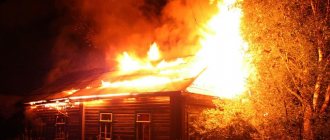New edition of Art. 168 of the Criminal Code of the Russian Federation
Destruction or damage to someone else's property on a large scale, committed through careless handling of fire or other sources of increased danger -
shall be punishable by a fine in the amount of up to one hundred twenty thousand rubles, or in the amount of the wages or other income of the convicted person for a period of up to one year, or by compulsory labor for a term of up to four hundred eighty hours, or by corrective labor for a term of up to two years, or by restriction of freedom for a term of up to one year. years, or forced labor for up to one year, or imprisonment for the same period.
Commentary on Article 168 of the Criminal Code of the Russian Federation
1. Careless destruction or damage to someone else's property causes enormous material damage. Therefore, its criminalization is justified.
2. The elements of a crime from the objective side are expressed in the destruction or damage of someone else’s property, causing material damage on a large scale.
3. For the concept of large size, see paragraph 4 of the note. to Art. 158. This consequence only covers actual damage caused to the owner of the property in an amount exceeding 250 thousand rubles.
3.1. Mandatory in qualifying an act as a crime is the method of causing harm - careless handling of fire or other sources of increased danger.
4. A crime can be committed as a result of both frivolity and negligence (see commentary to Article 26).
5. The subject of a criminal offense is a sane individual who has reached the age of 16 at the time of the commission of the crime.
6. If the destruction or damage to someone else’s property was a consequence of a violation of fire safety rules by a person who had the responsibility to comply with them, then the act is qualified under Art. 219. Also, according to special norms, the negligent infliction of damage to someone else’s property in violation of other rules is qualified (see Articles 215 - 218, 220, 224 - 225, etc.).
7. The acts are classified as crimes of minor gravity.
Commentary to Art. 168 of the Criminal Code of the Russian Federation
1. On the concept of someone else’s property, its destruction and damage, see the commentary to Art. 167.
2. If careless destruction or damage to property occurred not by handling sources of increased danger, but, say, by unintentional flooding by neighbors of an apartment located on the floor below, the act does not constitute a crime under the commented article.
Based on paragraph 1 of Art. 1079 of the Civil Code, activities associated with increased danger to others are the use of vehicles, mechanisms, high-voltage electrical energy, nuclear energy, explosives, potent poisons, etc.; carrying out construction and other related activities, etc. Handling fire in everyday life or, say, when committing another crime, thus does not correspond to the concept of the specified activity, however, the given reference to the civil law cannot limit the scope of the commented norm of the Criminal Code.
For example, among other things, O. was convicted under Art. 168 of the Criminal Code for dousing the victim with gasoline and demonstrating a lighter, from careless handling of which he himself caught fire, and this caused a fire in the house. ——————————— See: Cassation definition. RF Armed Forces dated October 27, 2010 N 10-010-30.
“Careless handling of fire or other sources of increased danger in the sense of Article 168... may, in particular, consist in improper handling of ignition sources near flammable materials, in the operation of technical devices with unrepaired defects (for example, using a tractor in the forest without a spark arrester, leaving without supervision of unextinguished stoves, fires or unswitched electrical appliances, gas burners, etc.)” (clause 11 of the Resolution of the Plenum of the Armed Forces of the Russian Federation dated 06/05/2002 N 14).
Violation of traffic rules while driving a car cannot be regarded as careless handling of a source of increased danger. This act is fully covered by the disposition of Art. 264 of the Criminal Code and additional qualifications under Art. 168 of the Criminal Code does not require. ——————————— Judicial practice of the Supreme Court of the Republic of Karelia in criminal cases for the second half of 2010, paragraph 2 // BVS of the Republic of Karelia. 2011. N 1.
3. In the event that a person sets fire to his own property, resulting in large-scale damage through negligence to someone else’s property or property that was the joint property of other persons and the culprit, the latter’s actions should be qualified as destruction or damage to someone else’s property through negligence ( clause 8 of the Post of the Plenum of the Armed Forces of the Russian Federation dated 06/05/2002 N 14).
4. Destruction or damage to property through negligence (including through careless handling of fire) is one of the crimes against property, liability for which is provided for in Chapter. 21 of the Criminal Code of the Russian Federation. In this regard, when deciding on the amount of destroyed or damaged property, one should be guided by paragraph 4 of the note. to Art. 158 of the Criminal Code (clause 7 of the Post. Plenum of the Armed Forces of the Russian Federation dated 06/05/2002 N 14).
5. The moment of completion of the crime is associated with the emergence of such a state of the damaged object, which can characterize it as destroyed or damaged, and the resulting damage as exceeding 250 thousand rubles. The question of the causal relationship between the actions of the perpetrator and the harm caused, as always happens when qualifying careless crimes, is quite complex. If, for example, the result of careless handling of fire was damage to property in an amount not exceeding 250 thousand rubles, and significantly greater damage was caused by actions to extinguish the fire, then all of these consequences can be imputed to the person as part of the commentary. crimes, if it is established that fire extinguishing was carried out in accordance with the requirements for such activities (taking into account the object, situation, available means, etc.).
6. The subject of the crime - general - is a sane individual who has reached the age of 16 at the time of committing the crime (Part 2 of Article 20 of the Criminal Code of the Russian Federation), based on the fact that the circle of such persons within the meaning of the commented norm is not limited to the owners mentioned in the civil law sources of increased danger.
7. The subjective side of the crime is negligence, which does not manifest itself in relation to such a characteristic of damage as its size (when a person mistakenly assumes that the property on which he deliberately has a destructive, damaging effect will not cause damage in the amount of more than 250 thousand rubles), but to the actual fact of causing damage to property.
8. Causing large damage through negligence may be a sign of another crime, for example, provided for in Art. 267 of the Criminal Code of the Russian Federation. The question of delimiting the relevant compositions arises, since although the mentioned norm deals with targeted actions of destruction, etc. TS, etc. (and this may also occur with the use of fire and other sources of increased danger), in relation to the destruction or damage of other property, the person may still not have intentional guilt. For example, when a person, out of mischief, sets fire to a signaling device, not expecting that the fire will spread to a passing train. In relation to the damage to the burnt composition as a consequence of these actions, the handling of fire was careless. In this case, the qualification of the act is also under Art. 168 of the Criminal Code will be redundant.
9. If, as a result of careless handling of fire or other sources of increased danger, resulting in the destruction or damage of someone else’s property on a large scale, a person’s death occurs, the actions of the perpetrator are qualified under a set of articles providing for liability for causing death by negligence (Article 109 of the Criminal Code of the Russian Federation) and destruction or damage to property due to negligence (Article 168 of the Criminal Code of the Russian Federation) (clause 11 of the Post. Plenum of the Armed Forces of the Russian Federation dated 06/05/2002 N 14).
Another comment on Art. 168 of the Criminal Code of the Russian Federation
1. Some of the signs of this crime coincide with the corresponding signs of Art. 167 of the Criminal Code of the Russian Federation.
2. The objective side of the crime involves the destruction or damage of someone else’s property on a large scale (note 4 to Article 158 of the Criminal Code of the Russian Federation), committed in a special way - through careless handling of fire or other sources of increased danger (clause 11 of the Resolution of the Plenum of the Supreme Court of the Russian Federation dated 5 June 2002 No. 14 “On judicial practice in cases of violation of fire safety rules, destruction or damage to property by arson or as a result of careless handling of fire.”
3. The subjective side is characterized by negligence.
Judicial practice: sentences and punishment under Art. 168 of the Criminal Code of the Russian Federation
- Resolution of the Plenum of the Supreme Court of the Russian Federation dated... PLENARY OF THE SUPREME COURT OF THE RUSSIAN FEDERATION DECISION dated December 27, 2002 N 29 ON JUDICIAL PRACTICE IN CASES OF THEFT,...
- Decision of the Supreme Court: Resolution No. 310P13 dated... DECISION OF THE PRESIDIUM OF THE SUPREME COURT OF THE RUSSIAN FEDERATION Case No. 310-P13 Moscow January 23, 2014 Presidium of the Supreme Court of the Russian Federation...
- Decision of the Supreme Court: Determination N 203-APU17-21... THE SUPREME COURT OF THE RUSSIAN FEDERATION Case No. 203-APU17-21 APPEAL DECISION Moscow August 31, 2022 Judicial Collegium for Military Personnel of the Supreme...
- Resolution of the Presidium of the Supreme Court of the Russian Federation dated... PRESIDIUM OF THE SUPREME COURT OF THE RUSSIAN FEDERATION DECISION dated December 5, 2018 N 126-P18 ON RESUMING PROCEEDINGS IN THE CASE DUE TO NEW...
- Judicial Collegium for Criminal Cases, appeal:... THE SUPREME COURT OF THE RUSSIAN FEDERATION Case No. 72-APU 17-21 APPEAL DECISION Moscow October 04, 2022 Judicial Collegium for Criminal Cases...
- Resolution of the Plenum of the Supreme Court of the Russian Federation dated... PLENARY OF THE SUPREME COURT OF THE RUSSIAN FEDERATION DECISION of November 15, 2016 N 48 ON THE PRACTICE OF APPLICATION BY COURTS OF LEGISLATION GOVERNING FEATURES...
- Resolution of the Plenum of the Supreme Court of the Russian Federation dated... PLENAUM OF THE SUPREME COURT OF THE RUSSIAN FEDERATION DECISION dated June 25, 2022 N 18 ON JUDICIAL PRACTICE IN CASES OF CRIMES,...
- Ruling of the ECtHR dated 02/14/2017 EUROPEAN COURT OF HUMAN RIGHTS THIRD SECTION CASE “MASLOVA VS. RUSSIAN FEDERATION” (Complaint No. 15980/12) JUDGMENT…
- Decision of the Supreme Court: Resolution No. 156P17 dated... DECISION OF THE PRESIDIUM OF THE SUPREME COURT OF THE RUSSIAN FEDERATION on the resumption of proceedings in the case due to new circumstances Case No. 156-Ш7 Moscow 27...
- Resolution of the Plenum of the Supreme Court of the Russian Federation dated... PLENAUM OF THE SUPREME COURT OF THE RUSSIAN FEDERATION DECISION dated December 17, 2022 N 43 ON SOME ISSUES OF JUDICIAL PRACTICE IN CASES...
What does Article 168 of the Criminal Code of the Russian Federation mean? I really need it
The same acts, committed by careless handling of fire or other sources of increased danger, or resulting in grave consequences, are punishable by a fine in the amount of two hundred to five hundred times the minimum wage, or in the amount of the wages or other income of the convicted person for a period of two to five months, or correctional labor for a term of one to two years, or restriction of liberty for a term of up to three years, or imprisonment for a term of up to two years.
Dmitry Master (1306) 7 years ago Article 168.
Totality
What to do if, as a result of destruction or damage to someone else’s property on an especially large scale, the death of a person occurs due to negligence? In this case, it is customary to consider two crimes simultaneously.
Which ones exactly? First of all, it does exist. Secondly, Article 168. The punishment will be imposed on the defendant in aggregate. That is, simultaneously under two articles. Not the most common case, but in practice it still occurs.
Usually, in such a situation, imprisonment is assigned for a particular period. These are all the features you need to know regarding the crime called “Destruction or damage to another’s property through negligence.” Please note that you will have to prove direct negligence. Otherwise, this crime will be punished according to other principles.
Try to follow fire safety rules and be careful when contacting sources of increased danger. Then and only then will it be possible to prevent the destruction or damage of other people’s property.
Works and labor
The penalties for damaging someone else's property, as well as for destroying it, do not end there. Fines are not always imposed when this crime is committed. In some cases, the court is able to sentence a citizen to public labor of varying durations and types.
Compulsory, corrective and forced labor are possible. They all differ in their duration. Typically, the duration of the penalty is determined by assessing the specific situation. But the duration of work cannot exceed, respectively: 480 hours, 2 years, 12 months.
It turns out that 168 indicates that not only monetary payments are due for destruction and/or damage to property. True, in real life it is fines that are in great demand.
Subjective side
Who could be the criminal? Article 168, or rather the commentary to it, indicates that a citizen who has reached the age of 16 can be the subject of a crime. Younger minors are not punished under this article.
There is intent in the offense. It is indicated that damage to someone else’s property, as well as its destruction, can be fraught with certain motives. Intent may be direct or indirect. Even more specific.
The goals and motives of the crime committed are also often highlighted. But they do not play the most important role. Necessary in order to separate the violation from related crimes (for example, hooliganism).
Objective side
This ends the possible penalties imposed for destroying or damaging someone else's property through negligence. But there are some peculiarities that the court must take into account and citizens must know.
For example, it is important to understand that “the object of the violation is social relations, which may fall into the category of “property”. But that is not all. The objective side is the direct destruction or damage to someone else’s property, if these outcomes occurred due to negligence of “contact” with fire or sources of increased danger.
Article 168 of the Criminal Code implies that the subject of the violation is someone else’s property. Moreover, both movable and immovable. Criminal liability will occur only if it is completely destroyed. Or when the damage caused can be called particularly large - from 250,000 rubles or more.
Criminal Code of the Russian Federation
Fraud. 1. Fraud, that is, theft of someone else’s property or the acquisition of rights to someone else’s property by deception or abuse of trust, is punishable by a fine in the amount of two hundred to seven hundred times the minimum monthly wage, or in the amount of the wages or other income of the convicted person for a period of two to seven months. , or compulsory labor for a term of one hundred eighty to two hundred and forty hours, or correctional labor for a term of one to two years, arrest for a term of four to six months, or imprisonment for a term of up to three years. 2. Fraud committed: a) by a group of persons by prior conspiracy; b) repeatedly; c) by a person using his official position; d) causing significant damage to a citizen - is punishable by a fine in the amount of seven hundred to one thousand times the minimum wage, or in the amount of the wages or other income of the convicted person for a period of seven months to one year, by imprisonment for a term of two to six years, with a fine. in the amount of up to fifty times the minimum wage or in the amount of wages or other income of the convicted person for a period of up to one month or without it. 3. Fraud committed: a) by an organized group; b) on a large scale; c) by a person who has been previously convicted two or more times for theft or extortion - is punishable by imprisonment for a term of five to ten years with or without confiscation of property. Article 160.
Carelessness
The comments to the article indicate the features of the crime. For example, what is meant by Generally, fire is a source of increased danger. But carelessness with it is failure to comply with fire safety rules established by law.
Also, Article 168 indicates that negligence can be understood as some other concepts. For example, operating equipment with defects. Or improper handling of flammable objects near an open fire.
Probation
Most citizens associate criminal liability to one degree or another. In some ways, this is indeed a correct interpretation of the punishments imposed for some violations.
Article 168 of the Russian Federation (Criminal Code), in addition to the above measures, for destruction or damage to the property of another citizen due to negligence, provides for restriction of freedom.
We are talking about the so-called suspended sentence. A suspended sentence can last up to 12 months. And nothing more. True, sometimes this period can increase. For example, when there was a violation associated with “destruction”. In this case, the court is able to extend the restriction of freedom. But in practice, such phenomena do not occur very often.






